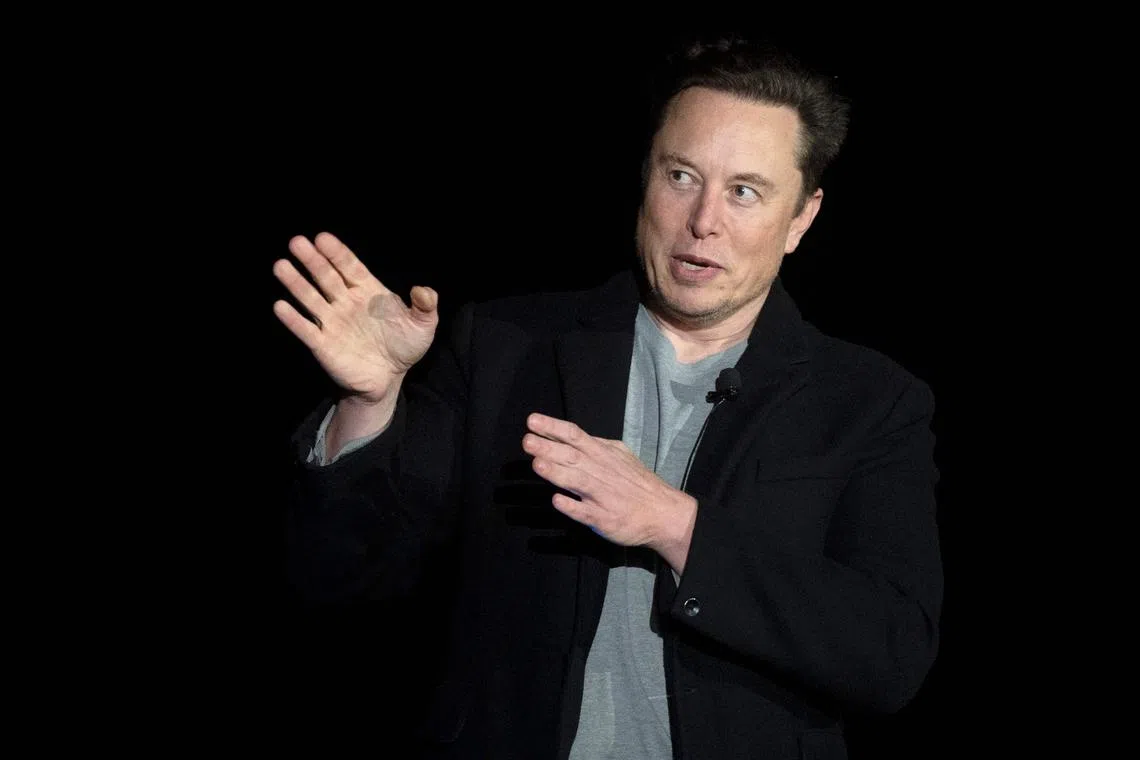Saudi wealth fund chief refuses to testify at Elon Musk’s Tesla fraud trial
Sign up now: Get ST's newsletters delivered to your inbox

Mr Elon Musk can’t count on the head of Saudi Arabia’s sovereign wealth fund to help his defence at an upcoming trial over claims by investors that the Tesla CEO defrauded them in 2018.
PHOTO: AFP
Follow topic:
SAN FRANCISCO – Mr Elon Musk can’t count on the head of Saudi Arabia’s sovereign wealth fund to help his defence at an upcoming trial over claims by investors that the Tesla CEO defrauded them in 2018.
Through their lawyers, Mr Yasir Al-Rumayyan and other officials from the kingdom’s Public Investment Fund (PIF) argued to the judge overseeing the case on Thursday that they’re not legally obligated to show up for the trial in San Francisco federal court that’s set to start Jan 17.
Investors allege Mr Musk misled them with tweets in August 2018 saying he had a plan to take the electric-car maker private with “funding secured”. The shareholders say the Twitter posts cost them billions of dollars by spurring wild swings in Tesla’s stock price. Mr Musk has maintained that the PIF agreed to support his bid.
Subpoenas requesting the PIF officials’ testimony “need not be complied with”, lawyers for the fund said, describing Mr Musk’s subpoenas as both “legally deficient” and half-hearted. The subpoenas are outside the jurisdiction of the San Francisco court and Mr Musk’s request for the testimony at trial was voluntary, the lawyers said.
“In other words, even defendants describe the subpoenas as having no force or effect,” according to the filing. Coming just weeks before the Jan 17 trial, Mr Musk’s request was delivered by “simply leaving a copy of the papers with an office administrator of a US subsidiary of the PIF in New York”.
Saudi Arabia’s fund has played a prominent but still opaque role in the lawsuit. Text messages between Al-Rumayyan and Mr Musk revealed in an April court filing showed that Mr Musk was upset because he believed he’d reached a handshake agreement with the PIF governor weeks earlier, in July 2018, to fund the transaction to take Tesla private.
But the exchange – which took place days after Mr Musk’s tweets roiled the market – also revealed tension in the relationship. Mr Al-Rumayyan tells Mr Musk that the PIF can’t make a commitment “that we don’t have sufficient information on”, adding that he’s been waiting for additional details.
Mr Musk’s previous court filings indicate he’s relying heavily on an argument that the PIF had tried to persuade Mr Musk to take Tesla private for years. His lawyers have described multiple meetings between the Tesla CEO and Mr Al-Rumayyan, including a 2017 dinner at Tesla’s factory where there was discussion of an estimated US$30 billion (S$40 billion) to US$60 billion required to fund the transaction.
“Mr Al-Rumayyan expressed that the PIF could easily provide the necessary funding,” Mr Musk’s lawyers said in the earlier filing. “Mr Musk understood based on these conversations that, if he wanted to take Tesla private, the PIF would do it.”
While Mr Musk can still make such arguments at trial, he will apparently have to rely on emails and without the testimony or corroboration of the Saudi officials. Mr Musk had refused to withdraw the subpoenas, forcing the PIF to formally request the judge handling the trial to reject them, the fund said in Thursday’s filing.
A hearing is scheduled for Friday on Mr Musk’s request to move the trial away from San Francisco, preferably to west Texas, where Tesla moved its headquarters about a year ago. The CEO argues that he can’t get a fair trial in northern California because jurors there harbour too much “negativity” toward him largely stemming from his shake-up of Twitter after buying the social media company in October for US$44 billion. BLOOMBERG

